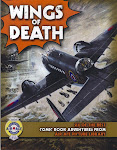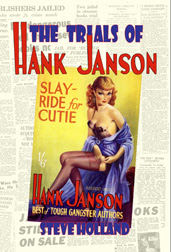Arriving with lots of internet fanfare and following on from a successful issue zero, which I thought was a solid start with one or two problems, we have Comic Scene #1. It's a bumper-sized celebration of women in comics, as both creators and characters, which is a splendid idea, but such a broad topic will always struggle to be all things to all people. The short (2- or 3-page) article format means that a lot can be covered in 80 pages, but space will always mean that your favourite might not have made the cut.
The most noticeable thing... well, the thing that I noticed, anyway, is that only 7 of the 80 pages were written by women; some of the interviews help with the balance, but a few more female voices would have been nice. And the article leading off this celebratory issue? "Why doesn't someone bring back Eagle?" which is the kind of thought-piece that might normally be run at the back of a mag.
The meat-and-gravy of the issue begins with a review of a book about Marie Duval (1847-1890), actress and artist who helped establish the character of Ally Sloper in the pages of Judy Magazine, sharing duties at first with Sloper's creator, her lover Charles Ross, and then taking over the character in 1870-77. We then jump to a look at Professor Peabody, one of Dan Dare's scientific team, which perhaps goes to emphasise how advanced the strip and its creator Frank Hampson was in terms of gender and race. Shame there was no mention of Helen Sharman, Britain's first astronaut, who seems to always be forgotten.
A brief lope through 25 years of Vertigo gets us to a brief interview with Karen Berger, mostly about Berger Books, her new imprint at Dark Horse, but managing not to mention a single project that she is currently working on, which include work by British creators like Dave Gibbons and Warren Pleece. Emma Beeby, another British Berger Books contributor (Mata Hari) is interviewed but, again, all too briefly with no space to discuss her work on 2000AD – she was the first woman to write Judge Dredd, which you would think would merit a little more space in an issue dedicated to women in comics. (Richard Bruton does make up for it a little with a look at the all-female 2000AD Sci-Fi Special later in the issue, as does Chris McAulay, with a nice tribute to Fay Dalton.)
Tim Hayes and Martin Dallard provide some of the issue's best pieces, on the Russian/Czech heroine Octobriana, who popped up in Luther Arkwright and Nikolai Dante; on Minnie the Minx; and on Cat Girl. Julia Round offers an overview of Misty comic, which only adds to the argument that the most innovative comics writing in the 1970s and 1980s was taking place in girls' comics, leaving boys' comics in their dusty wake. Nobody can argue that any innovations shown by Battle Picture Weekly and 2000AD owed a debt to what Wilf Prigmore, Gerry Finley-Day and others were doing in girls' comics.
Ice-skating heroine Valda, The Supercats and gymnast Bella at the Bar all come under the spotlight, as do 2000AD's Judge Anderson and Slaine. The latter allows Pat Mills to reveal just how influential his wife Angie Mills was in the creation of the character in an extract from his Kiss My Axe! book, which will be out at the end of the year. Pat also wraps up the issue with a look back at the girls' comics he worked on.
There are interviews with Sarah Laing on her fascination with Katherine Mansfield; Susie Gander on her battle against Hodgkin's lymphoma and her Kickstarter success, Periwinkle; and Rachael Smith on her web-comics and self-published comics.
Elsewhere we have a preview of The Vigilant, Rebellion's new team-up of old Fleetway characters; a look at Doctor Who's female companions; part 2 of John McShane's secret history of Toxic!; Liam Sharp talks about his time drawing Wonder Woman; Phil Clarke discusses the first British comic convention in 1968; and there's a look back at the art of Yvonne Hutton, who was the first woman to draw sports stories for Tiger in the 1960s.
There's a lot to like in this issue, but I'd still like to see a couple of longer interviews or retrospectives. And one thing has been bugging me since the cover was first displayed on the internet. "Laydeez Do Comics" is not, I suspect, going to sell many issues to the female audience. Quick rule of thumb: try it with a male nickname and misspell that and ask yourself: Do you think "Blerks Do Comics" will sell copies to men? If the answer is no, the same argument applies to the "Laydeez".
Details about subscriptions can be obtained from www.comicscene.org.
Rates for print issues for the UK are £5.99 for one issue; £35 for 6
issues; £68 for 12 issues.You can get a pdf version for £3.99 (1), £22
(6) or £40 (12).
Payment can be made via PayPal to comicsceneuk@gmail.com. For other options, and for international rates for the print edition, visit the website.
Monday, July 30, 2018
Subscribe to:
Post Comments (Atom)



























































Laydeez do comics is of course a 'thing' (see here - https://laydeezdocomics.wordpress.com/) but it's probably lost on the general public and I don't know if they feature in the mag.
ReplyDeleteAnyhow, a useful, balanced review as usual and no grumbles about my articles :)
I'm surprised. Having spoken to a couple of non-comic-buying ladies, and one who does buy comics, about it, their thoughts ranged from it being pointless to it being inappropriate.
ReplyDeleteAnd I'll try extra hard to find something to complain about in your next article. :-)
am sure you won't have to try too hard, ha ha! Keep up the great work
ReplyDelete